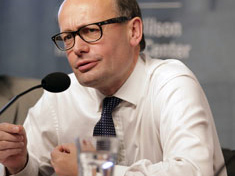-
Rear Admiral Neil Morisetti on Opportunities for Transatlantic Cooperation on Climate Change, Energy
August 16, 2013 By Jacob Glass
“We’ve got real pressure on key natural resources: food, water, energy, and land,” says Rear Admiral Neil Morisetti, the U.K. Foreign and Commonwealth Office’s special representative on climate change, in this week’s podcast. “But what we haven’t got, if I can use the words of Winston Churchill, we haven’t got ‘action this day.’”
“Morisetti spoke at the Wilson Center on June 6 for the launch of The Climate and Energy Nexus: Challenges and Opportunities for Transatlantic Security, by CNA and the Royal United Services Institute. As climate change threatens stability in some places, energy security has emerged as a key vulnerability to Western militaries’ abilities to respond to conflict and assist in disaster relief operations, says Morisetti.
“We’ve got real pressure on key natural resources: food, water, energy, and land,” says Rear Admiral Neil Morisetti, the U.K. Foreign and Commonwealth Office’s special representative on climate change, in this week’s podcast. “But what we haven’t got, if I can use the words of Winston Churchill, we haven’t got ‘action this day.’”
“Morisetti spoke at the Wilson Center on June 6 for the launch of The Climate and Energy Nexus: Challenges and Opportunities for Transatlantic Security, by CNA and the Royal United Services Institute. As climate change threatens stability in some places, energy security has emerged as a key vulnerability to Western militaries’ abilities to respond to conflict and assist in disaster relief operations, says Morisetti.
“The United Kingdom, [U.S.] Department of Defense, and NATO nations have recognized that the way we’ve been using energy in the past is not sustainable. The 22 gallons per man, per day being used in operations doesn’t work.”
Instead, he encourages increasing transatlantic cooperation to help achieve strategic energy needs. Meeting with U.S. leaders at national, state, and local levels underscored for Morisetti the opportunities for expanding regional partnerships – both public and private – to facilitate the sharing of ideas and technologies to improve the climate-readiness of NATO.
“Last year was the 200th anniversary of when [the U.S. and UK] stopped fighting each other. Since then, we have fought together to meet the challenges we face,” he says. “This is one of the challenges of today and the future, and we’ll be much better if we work together.”
“Above all, we all need to show leadership in this issue. If we do…then not only will we reduce the risks posed to our economic resilience and national securities, but we’re going to enjoy the benefits as well.”
Friday podcasts are also available for download from iTunes.
 A Publication of the Stimson Center.
A Publication of the Stimson Center.




